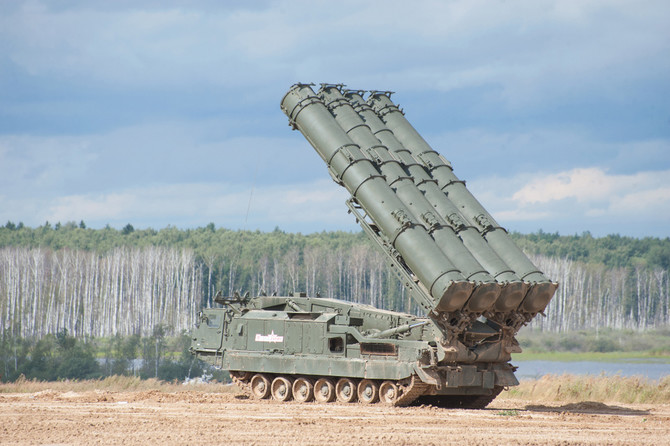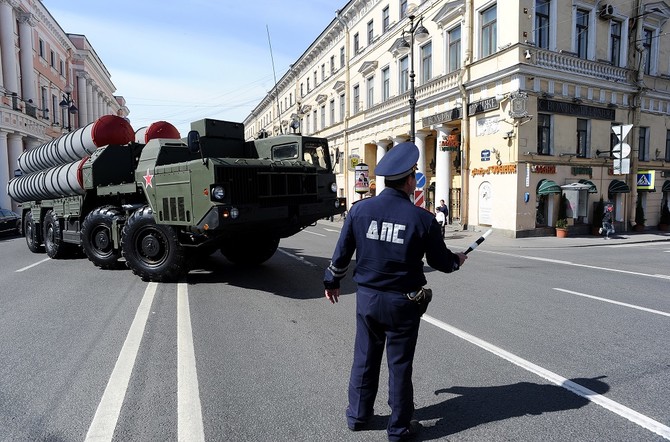MOSCOW/JEDDAH: Russia is to supply the Assad regime with sophisticated S-300 air-defense missile systems in what the US described on Monday as a “significant escalation” of the Syrian conflict.
The US Secretary of State, Mike Pompeo, said he would raise the matter this week with the Russian Foreign Minister Sergey Lavrov at the UN General Assembly in New York.
The move follows a “friendly fire” incident last week when Syrian forces accidentally shot down a Russian military reconnaissance aircraft and killed all 15 people on board. Russia said Israeli fighter jets had pushed the plane into Syria’s line of fire.
The S-300 missile defense systems will be delivered to Damascus within two weeks, Russian Defense Minister Sergei Shoigu said on Monday.
He said that President Vladimir Putin ordered additional security measures after a Syrian Soviet-era S-200 missile shot down the Russian military plane by mistake, killing 15, in an incident last Monday that Moscow blames on Israel.
“This has pushed us to adopt adequate response measures directed at boosting the security of Russian troops” in Syria, Shoigu said in a televised statement.
“(Russia will) transfer the modern S-300 air defense system to the Syrian armed forces within two weeks.”
Earlier in the war, Russia suspended a supply of S-300s. “The situation has changed, and it’s not our fault,” Shoigu said.
Russia will also equip Syrian air defenses with a new automated control system to enhance its efficiency and help identify Russian aircraft, Shoigu said.
The Russian military will start using electronic countermeasures to jam any aircraft that try to launch attacks off Syria’s coast.“We are convinced that these measures will calm down some hotheads and keep them from careless actions that pose a threat to our troops,” he said.
The S-300 missile system, originally developed by the Soviet military but since modernized and available in several versions with different capabilities, fires missiles from trucks and is designed to shoot down military aircraft and short and medium-range ballistic missiles.

A surface-to-air missile launched by an S-300 anti-aircraft system at Russia's Astrakhan region in 2017. Shutterstock photo)
'Iran is to blame'
“We think introducing the S-300s to the Syrian government would be a significant escalation by the Russians ... and something that we hope, if these press reports are accurate, they would reconsider,” US National Security Adviser John Bolton said.
“There shouldn’t be any misunderstanding here. The party responsible for the attacks in Syria and Lebanon and really the party responsible for the shooting down of the Russian plane is Iran.”
Bolton warned that if the Syrian government used chemical weapons again, the US response would be significant.
“If in fact they make the mistake of using chemical weapons again, the retaliation would be much stronger than before and would have the intended effect of creating structures of deterrence that they never do it again,” he said.
Bolton said the US was doing everything it could to ensure Syria did not use chemical weapons and had pressed Russia about the issue as well. Bolton said a political process was needed but Russia supplying the missile system made that difficult.
He said US troops would remain in Syria as long as Iran was involved.
“We’re not going to leave as long as Iranian troops are outside Iranian borders, and that includes Iranian proxies and militias.”
Russians not convinced
Moscow says Israeli F-16 planes which struck Latakia in western Syria on Sept. 17 later used the landing Russian Il-20 surveillance plane as “cover,” which resulted in the larger Il-20 being hit by a Syrian missile.
The Russian military has said that Israel’s air force informed its command in Syria via the established de-confliction hotline, but only one minute before the air strikes — and gave the wrong target location.
Because of this, Moscow claims that the Russian airforce could not keep its plane safe.
Israel regularly carries out strikes in Syria against Assad’s government, its Lebanese ally Hezbollah and Iranian targets. An Israeli military delegation traveled to Moscow last week to share information about the incident.
An Israeli official said the information showed that the Russian plane was shot down because Syrian batteries had “fired recklessly, irresponsibly and unprofessionally, long after our planes were no longer there.”
He said the warning time before the strike was “much longer than one minute.”
Russia has apparently not found this convincing.
Kremlin spokesman Dmitry Peskov on Monday said the incident was caused by “premeditated” actions by Israeli pilots, warning that this will harm relations between the two countries.
“According to information of our military experts, the reason (behind the downing) were premeditated actions by Israeli pilots which certainly cannot but harm our relations,” Peskov told journalists.
The incident was the deadliest case of friendly fire between Syria and its key backer Russia since Moscow’s 2015 military intervention, which turned the war in Assad’s favor.
Peskov said the new measures were only to boost the security of its troops in Syria.
(With AFP)



























